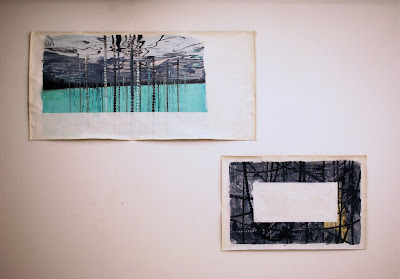1 februari 2012
Master expo

Dripdrops, 2010, 65 x 95 cm, oil and pencil on paper
Sketches, 2010, acrylic (and pencils) on paper
Framing the frame, 2010, 92 x 142 cm, oil on canvas
Perpetual pearls, 2010, 140 x 215 cm, oil on canvas
Pools of reflection, 2010, 110 x 215 cm, oil on canvas
ABOUT
In my work, ornaments are being extracted from reality, where they have an inferior function, and combined in such a way that they lose every familiar significance. By putting a focus on the decorative I question the boundary between subjectivity and objectivity. Because of this hybridity, ornaments radiate a sense of animism: rosettes and chandeliers become menacing, motives turn into rampant lines that seem to spin an imaginary web. The images I create are suggestive.
Japanese thinking relates to repetitiveness, the fullness of emptiness, strangeness and animism. In the image, I want to create an ambiguity and explore the boundary between painting and decoration. I want to take painting from its pedestal, tilt the image.
The whole process unfolds itself in sketches and paintings on canvas and paper. Sketches are a first step in the creation of imaginary images. Repetitiveness is a crucial aspect that shows itself in the ornamentality and in the action. This way, the repetition of lines becomes a ritual where image and artist empty themselves. I also retake fragments from previous works. Like this, many layers and series take form.
Decoration undermines the position of the painting in the Western perception. Interventions, such as the fact that the canvas is not being stretched, extend on this. This results in a boundless character without the binding (frame) of the classic painting. Just like the sketches, the paintings have a white residual space. This way, I show both the hand of the painter, and that what Kant defines as parerga (Kritik der Urteilskraft §14, 226): I explore the boundaries of what is part of the artwork and what is extra and becomes mere adornment.
There are no facts, only interpretations. That is why I question painting and the world. Both want to show a true reality but break down to a game of interpretations. I impose, like in Wunderkammers, a personal reality, that can exists besides other ones. It's about the depriving of dogmas, in order for them to become fables, aware of them being fables.
Japanese thinking relates to repetitiveness, the fullness of emptiness, strangeness and animism. In the image, I want to create an ambiguity and explore the boundary between painting and decoration. I want to take painting from its pedestal, tilt the image.
The whole process unfolds itself in sketches and paintings on canvas and paper. Sketches are a first step in the creation of imaginary images. Repetitiveness is a crucial aspect that shows itself in the ornamentality and in the action. This way, the repetition of lines becomes a ritual where image and artist empty themselves. I also retake fragments from previous works. Like this, many layers and series take form.
Decoration undermines the position of the painting in the Western perception. Interventions, such as the fact that the canvas is not being stretched, extend on this. This results in a boundless character without the binding (frame) of the classic painting. Just like the sketches, the paintings have a white residual space. This way, I show both the hand of the painter, and that what Kant defines as parerga (Kritik der Urteilskraft §14, 226): I explore the boundaries of what is part of the artwork and what is extra and becomes mere adornment.
There are no facts, only interpretations. That is why I question painting and the world. Both want to show a true reality but break down to a game of interpretations. I impose, like in Wunderkammers, a personal reality, that can exists besides other ones. It's about the depriving of dogmas, in order for them to become fables, aware of them being fables.
Jungle lace, 2010, 140 x 215 cm, oil and pencil on canvas
The grid, 2010, 110 x 200 cm, oil and spraypaint on canvas
The Cover-up, 2010, 140 x 215 cm, oil on paper and canvas
Abonneren op:
Reacties (Atom)























